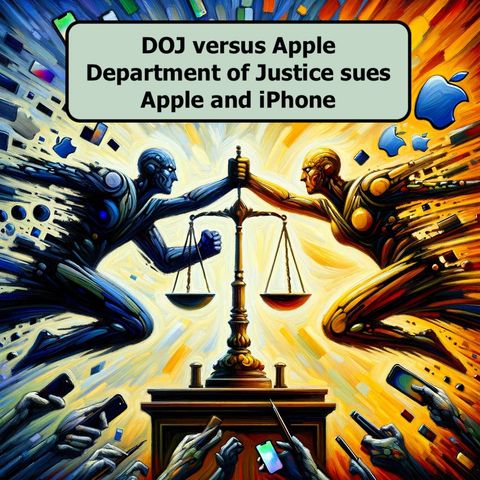'Instant Ink' Renders Printers 'Entirely Worthless,' Claims Class Action Lawsuit

Sign up for free
Listen to this episode and many more. Enjoy the best podcasts on Spreaker!
Download and listen anywhere
Download your favorite episodes and enjoy them, wherever you are! Sign up or log in now to access offline listening.
'Instant Ink' Renders Printers 'Entirely Worthless,' Claims Class Action Lawsuit
This is an automatically generated transcript. Please note that complete accuracy is not guaranteed.
Description
In a headline-generating move, the Department of Justice (DOJ) has slammed the technology giant Apple Inc with an antitrust lawsuit, accusing the company of monopolistic practices concerning the usage of...
show moreAt the heart of the issue is the firm's tight control over its vast digital ecosystem, the centerpiece of which is the much-beloved iPhone. Arguably one of the most iconic consumer electronic devices today, the iPhone has not only seen astronomical sales and usage figures but also faced allegations of running a 'closed' and uncompetitive market environment.
The Department of Justice argues that this protective ecosystem, which fundamentally ties iPhone users to Apple's apps and services, creates a monopoly. It alleges that through its onerous restrictions and guidelines, Apple is unfairly hindering competition and stunting market innovation.
In specific terms, the DOJ's lawsuit alleges that Apple utilizes its operating system, iOS, to maintain a 'walled garden', wherein the company exercises full control over the availability of apps and services. This practice, the lawsuit contends, places Apple in a position of undue power, granting it a monopolistic stranglehold over iOS app developers and consumers.
Critics of Apple's business model maintain that this stringent control robs consumers of the ability to choose, limits developers' market access, and curtails innovation in this intensely competitive sector. The argument further extends to the assertion that these limitations ultimately translate into higher costs for consumers, who may unwittingly find themselves trapped within Apple's ecosystem.
The lawsuit also highlights the contentious issue of Apple's App Store fees. Developers are required to pay the company up to 30% of their revenue as a fee for listing their apps on the App Store – an aspect that has been a significant point of contention between Apple and developers. The Department of Justice perceives this as another instance of Apple's alleged monopolistic behavior.
Apple, for its part, has consistently defended its business strategies, arguing that the iPhone's closed system ensures greater security, reliability, and quality for its users. The company also asserts that its App Store presents a diverse and accessible market that allows millions of developers to reach consumers.
As the lawsuit continues to unravel and heads towards a potentially taxing legal battle, it heralds key discussions about the operations of big tech companies, the power they exercise over digital markets, and the impact that these factors have on consumers and developers alike. It's clear that the outcome of this lawsuit could not only shape the future of Apple but could also have far-reaching implications for the tech world at large.
Information
| Author | QP-3 |
| Organization | William Corbin |
| Website | - |
| Tags |
Copyright 2024 - Spreaker Inc. an iHeartMedia Company
